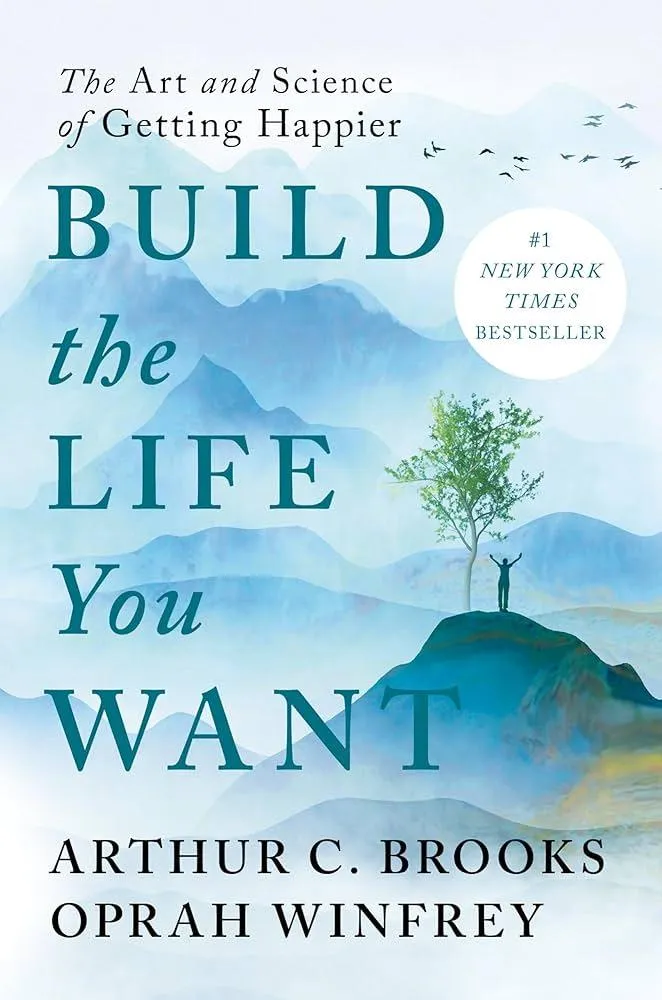
I'm on a mission to build things that connect
I'm on a mission to:
BUILD THINGS THAT CONNECT
Curent Focus: The Book Club
Current Focus: The Book Club
My Latest Blog

Key Takeaways: Build The Life You Want by Arthur C. Brooks & Oprah Winfrey
Note: This is not a summary. Some parts of the book might be missing. These are the take-aways and notes I made without the intention of publishing them.
On Happiness
Happy feelings are not happiness, but evidence of happiness. Just like the smell of dinner is not the dinner, but just a part of it.
Feelings that make up happiness:
enjoyment (not pleasure)
satisfaction
purpose
hedonic treadmill = we adapt quickly to good things and have to keep running to stay satisfied. Not desirable. Comparable to a drug addict whose tolerance goes up.
unhappiness is not the opposite of happiness
PANAS profile quiz (Links to PDF by Arthur Brooks to find out which direction you lean towards - positve/negative/middle)
happiness is not a state of being but a state of doing
"Your emotions are only signals. And you get do decide how to respond to them."
rewrite or shift aspects of your painful past as long as you are not lying to yourself. Find positives or teaching moments.
keep a failure journal: write out what happened. Leave space below. After 1 month, write what you learned (could just be that after 5 days it didn't bother you anymore) from the bad experience. After 6 months, write what the positives were that ultimately came (eg getting fired might be a wake up call). Set reminders in your calender.
Hope > optimism
Better to be a hopeful pessimist. Optimistic people have a tendency to put responsibility or outcome outside their control ("Oh it will get better", "We'll be home by christmas"). If a desired scenario doesn't come, it can lead to disappointment or heartbreak or even loss of faith. Therefore it's often better to see things as they are, but allow yourself to hope for a better future under the assumption that you are actively working towards it. It might not come and you realize that, but you have hope and are trying VS this WILL happen because I it's fair and I deserve it.from time to time say "I don't know what this day will bring, but I will accept it."
The 4 happiness pillars: family, friendship, work, faith
Helping Others
Show compassion, not empathy.
Don't suffer with someone, but support them to do the hard thing that will actualy help. Studies have shown that empathy (feeling someone else's pain) will slighty help the person in pain, but drastically increase the helper's pain. More pain is created. Long term, it's better to grow resilience.
Sometimes tough love is necessary. Do acknowledge their pain, but don't wallow in it ("Oh you poor thing!"). -> "This sucks and it's unfair, take the time you need to process. But when the time comes (probably sooner than later) you'll have to wrap yourself up again, and I'll be there for you to assist you."
Opinions
Marcus Aurelius: "We all love ourselves more than other peole, but care more about their opinion than our own."
focus on others, but not on their opinion of you
Lao Tzu: "Care about people's approval and you will be their prisoner"
your family cares less about how you live and more about what you say about what they believe
live your life that is true to you, but don't ask others (especially family) to change their own values
Negative Emotions
on shame: what am I hiding that I'm a little embarrassed about? -> own the source of your embarrassement
when feeling envy, reflect on all their every day mundane activities and ups and downs of that person. Picture them on the toilet, having sex, commuting to work, etc.
Dealing with a negative person you love:
"Put on your own oxygen mask first"
You need to protect your own happiness so you can help others. Give yourself 1-2 hours first where you work on your happiness (exercise, meditation, calling a friend, etc). and focus on what you enjoy and feel grateful for.Don't take negativity personally. Remind yourself that "it's not my fault and I won't take this personally". They might blame you in frustration, but don't blame yourself unless you actualy injured them.
Break the negative culture with surprise. Ordinary activities you usually enjoy can seem like a chore when sad or depressed. But if the opportunity is spontaneosly presented, they might say yes. The less obstacles the better (eg instead of asking if they want to rent some scooters and ride around town, show up with the scooters and their shoes in hand)
Don't spread the negativity virus if you are the unhappy one. Be open and don't hide it. Appreciate the effort to help. Tell them if applicable: "I want you to know that although I'm going through a hard time right now, it's not your fault"
Making & Keeping Friends
when you meet someone you like, don't overthink it, invite them over
instead of a "you are wrong"-approach, have a "tell me more"-approach
Curiosity > Confrontationdon't be too attached to your views or opinions.Iff critics say you are "constantly" switching opinions -> "when events/circumstances change, I change my mind. What do you do?"
when showcasing success, include the real bad things that are truly authentic and don't humble-brag, be honest
"idols" that occupy our days and waste our lives: money, power, pleasure, prestige
Develop the deep friendship of a companioate love that lasts
lighten up. have fun together and joke around
use more "we" and less "you / I"
have a shared bank account
treat arguments as an exercise
exclusivity (monogamy)
On Work:
Seek instrinsic rewards from work (like making a usually boring excel sheet beautiful if you enjoy that)
Figure out your career type: linear, steadystate, transitory, spiral
Don't succumb to work addiction
Don't identify yourself with your job title. Have people that see and know you just as [your name] (without the job or education title)
Spend 15 minutes a day on philosophy and spirtuality
My Latest Youtube Video

Key Takeaways: Build The Life You Want by Arthur C. Brooks & Oprah Winfrey
Note: This is not a summary. Some parts of the book might be missing. These are the take-aways and notes I made without the intention of publishing them.
On Happiness
Happy feelings are not happiness, but evidence of happiness. Just like the smell of dinner is not the dinner, but just a part of it.
Feelings that make up happiness:
enjoyment (not pleasure)
satisfaction
purpose
hedonic treadmill = we adapt quickly to good things and have to keep running to stay satisfied. Not desirable. Comparable to a drug addict whose tolerance goes up.
unhappiness is not the opposite of happiness
PANAS profile quiz (Links to PDF by Arthur Brooks to find out which direction you lean towards - positve/negative/middle)
happiness is not a state of being but a state of doing
"Your emotions are only signals. And you get do decide how to respond to them."
rewrite or shift aspects of your painful past as long as you are not lying to yourself. Find positives or teaching moments.
keep a failure journal: write out what happened. Leave space below. After 1 month, write what you learned (could just be that after 5 days it didn't bother you anymore) from the bad experience. After 6 months, write what the positives were that ultimately came (eg getting fired might be a wake up call). Set reminders in your calender.
Hope > optimism
Better to be a hopeful pessimist. Optimistic people have a tendency to put responsibility or outcome outside their control ("Oh it will get better", "We'll be home by christmas"). If a desired scenario doesn't come, it can lead to disappointment or heartbreak or even loss of faith. Therefore it's often better to see things as they are, but allow yourself to hope for a better future under the assumption that you are actively working towards it. It might not come and you realize that, but you have hope and are trying VS this WILL happen because I it's fair and I deserve it.from time to time say "I don't know what this day will bring, but I will accept it."
The 4 happiness pillars: family, friendship, work, faith
Helping Others
Show compassion, not empathy.
Don't suffer with someone, but support them to do the hard thing that will actualy help. Studies have shown that empathy (feeling someone else's pain) will slighty help the person in pain, but drastically increase the helper's pain. More pain is created. Long term, it's better to grow resilience.
Sometimes tough love is necessary. Do acknowledge their pain, but don't wallow in it ("Oh you poor thing!"). -> "This sucks and it's unfair, take the time you need to process. But when the time comes (probably sooner than later) you'll have to wrap yourself up again, and I'll be there for you to assist you."
Opinions
Marcus Aurelius: "We all love ourselves more than other peole, but care more about their opinion than our own."
focus on others, but not on their opinion of you
Lao Tzu: "Care about people's approval and you will be their prisoner"
your family cares less about how you live and more about what you say about what they believe
live your life that is true to you, but don't ask others (especially family) to change their own values
Negative Emotions
on shame: what am I hiding that I'm a little embarrassed about? -> own the source of your embarrassement
when feeling envy, reflect on all their every day mundane activities and ups and downs of that person. Picture them on the toilet, having sex, commuting to work, etc.
Dealing with a negative person you love:
"Put on your own oxygen mask first"
You need to protect your own happiness so you can help others. Give yourself 1-2 hours first where you work on your happiness (exercise, meditation, calling a friend, etc). and focus on what you enjoy and feel grateful for.Don't take negativity personally. Remind yourself that "it's not my fault and I won't take this personally". They might blame you in frustration, but don't blame yourself unless you actualy injured them.
Break the negative culture with surprise. Ordinary activities you usually enjoy can seem like a chore when sad or depressed. But if the opportunity is spontaneosly presented, they might say yes. The less obstacles the better (eg instead of asking if they want to rent some scooters and ride around town, show up with the scooters and their shoes in hand)
Don't spread the negativity virus if you are the unhappy one. Be open and don't hide it. Appreciate the effort to help. Tell them if applicable: "I want you to know that although I'm going through a hard time right now, it's not your fault"
Making & Keeping Friends
when you meet someone you like, don't overthink it, invite them over
instead of a "you are wrong"-approach, have a "tell me more"-approach
Curiosity > Confrontationdon't be too attached to your views or opinions.Iff critics say you are "constantly" switching opinions -> "when events/circumstances change, I change my mind. What do you do?"
when showcasing success, include the real bad things that are truly authentic and don't humble-brag, be honest
"idols" that occupy our days and waste our lives: money, power, pleasure, prestige
Develop the deep friendship of a companioate love that lasts
lighten up. have fun together and joke around
use more "we" and less "you / I"
have a shared bank account
treat arguments as an exercise
exclusivity (monogamy)
On Work:
Seek instrinsic rewards from work (like making a usually boring excel sheet beautiful if you enjoy that)
Figure out your career type: linear, steadystate, transitory, spiral
Don't succumb to work addiction
Don't identify yourself with your job title. Have people that see and know you just as [your name] (without the job or education title)
Spend 15 minutes a day on philosophy and spirtuality
My Favourite Project
Sound on! ;)
The Book Club
📚
1. We Pick A Book
We vote for one book out of 3 suggestions. The book with the most votes wins.
📖
2. We Read It
We read the book over the course of a month, sometimes together.
💬
3. We Meet IRL
After a short ice breaker, we discuss what we learned and how we will implement it.
Message me
FAQs
Why did you create this website?
I wanted something where I could express myself that was truly my own. No algorithms, not likes and followers, just pure authentic creation without the need for validation.
What do you actually do?
Haha, depends who's asking.
Who do you look up to?
Richard Branson.
Favourite soup?
Pumpkin or sweet potato




